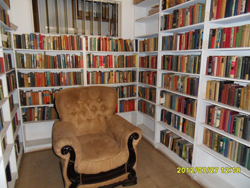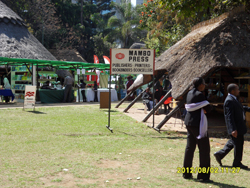Documenting the Gaps or Decolonising the Collection? A report on Fourth Acquisitions trip to Mutare, Bulawayo and Harare (Zimbabwe)
by Gerard C. van de Bruinhorst
 It was well into the second week of my stay in Zimbabwe (23 July – 4 August 2012) when I suddenly realized that this whole acquisition enterprise was heading for disaster. With just a few days left my efforts had only amounted to 26 books fitting the collection profile of the library (recent academic works on social sciences, humanities and literature). All of these titles could have been purchased much cheaper through our regular suppliers. My experience was in stark contrast to earlier and much more successful trips of the ASC library staff to Zimbabwe in 1997 (Marlene van Doorn and Elli de Rijk), 1999 (Tiny Kraan and Katrien Polman) and 2001 (Tiny Kraan and Sjaan van Marrewijk). So a rather existential question emerged: what was I doing in Zimbabwe?
It was well into the second week of my stay in Zimbabwe (23 July – 4 August 2012) when I suddenly realized that this whole acquisition enterprise was heading for disaster. With just a few days left my efforts had only amounted to 26 books fitting the collection profile of the library (recent academic works on social sciences, humanities and literature). All of these titles could have been purchased much cheaper through our regular suppliers. My experience was in stark contrast to earlier and much more successful trips of the ASC library staff to Zimbabwe in 1997 (Marlene van Doorn and Elli de Rijk), 1999 (Tiny Kraan and Katrien Polman) and 2001 (Tiny Kraan and Sjaan van Marrewijk). So a rather existential question emerged: what was I doing in Zimbabwe?
Apart from the not insignificant aspect of public relations, contacts and networking, the justifications of acquisitiontrips by special Africana collections librarians usually come in two shapes. Traveling to Africa is often driven by the expectation to get material cheaper and/or earlier than by relying on ordinary book traders. Even when accounting for all additional costs of traveling and shipping, in most cases the price per book is substantially lower than ordering these titles on the global market. ASC experience with acquisitiontrips also confirms that in roughly 25% of these locally purchased books, titlerecords appear to be the first ones catalogued in the more than 10.000 memberlibraries of WorldCat. In the case of Zimbabwe, due to the dollarization of the economy in 2009 to fight the devastating hyper-inflation of the local currency paired to a weak Euro against the dollar, bookprizes are prohibitively expensive compared to other African countries. For example the fascinating biography of Morgan Tsvangirai was offered for 55 USD whereas the library paid for the same new hardcopy just 22 USD. Even worse, due to the almost complete collapse of the Zimbabwean book industry, new titles are all but non-existent. Most authors either self publish or use conventional publishinghouses abroad and in both cases traveling to Zimbabwe will not help the library to acquire these titles in an early stage. (One of the most ‘recent’ books is the 2010 autobiography by Phinias-Mogorosi Makhurane I purchased, but the book is already available at 15 other WorldCat libraries).
A second rationalization of these expensive journeys is often born of the awareness that collecting practices are inherently biased. Colin Darch, Senior Information Specialist at University of Cape Town and regularly collecting books in the field, writes about this aspect of collection development:
“Librarians have a responsibility to recognise that their practice cannot be valuefree, and that their collections are biased by the choices made by writers, by publishers, and lastly by themselves.”
This aspect of values was visible in the different ways how the Zimbabwean press covered the Book Fair. The nationalistic newspaper Patriot demonstrated the Rhodesian and neo-colonial roots of the event and showed the frontpage heading “Black faces white minds at Book Fair.” During my trip to Zimbabwe, and even more when assessing the material I bought there, I realized that this bias is also existent in the acquisitionmethods we apply. The number of reliable internetshops, large publishers and specialized African print book vendors is limited and therefore it is not surprising that they all have the same customers. Books these aggregators do not offer, are likely to escape the attention of African studies librarians. Self published books and materials from small commercial and non-commercial publishers are usually difficult to locate or order by post and therefore less likely to find their way in library collections. In practical terms that means that almost every memoir published by white Zimbabwean rangers and farmers is available in the ASC collection, whereas black experiences voiced in prose and poetry but usually published by other media (newspapers, weblogs) is far less visible in the library. The non-existence of ‘normal’ books forced me to use the opportunity to look for the gaps in our collections, to raise awareness of these biases and address them.
 The facts: in 11 days I travelled from the eastern miningtown Mutare near the border of Mozambique, via Bulawayo in the South to the northern capital Harare. At 80 different shops, NGO’s, publishers, political parties and other publishing entities I collected about 200 items. Mostly print books but also audiovisual material, newspapers and pamphlets. In Harare I attended the Indaba conference “AFRICAN LITERATURE IN THE GLOBAL & DIGITAL ERA” and the Zimbabwe International Book Fair. Apart from the freezing cold at night, the season of visiting was very interesting. Not only the census preparations and the Olympics in London (7 Zimbabwean athletes, no medals) kept Zimbabwean busy, but also the pending EU decision to lift the sanctions and the long awaited final draft of the new constitution had been published less than a week before my arrival. A string of documents (among others a leaked version from February 2012, the official draft from July and the 17 pages damning criticism Mugabe’s Politbureau came up with) contextualizes this process.
The facts: in 11 days I travelled from the eastern miningtown Mutare near the border of Mozambique, via Bulawayo in the South to the northern capital Harare. At 80 different shops, NGO’s, publishers, political parties and other publishing entities I collected about 200 items. Mostly print books but also audiovisual material, newspapers and pamphlets. In Harare I attended the Indaba conference “AFRICAN LITERATURE IN THE GLOBAL & DIGITAL ERA” and the Zimbabwe International Book Fair. Apart from the freezing cold at night, the season of visiting was very interesting. Not only the census preparations and the Olympics in London (7 Zimbabwean athletes, no medals) kept Zimbabwean busy, but also the pending EU decision to lift the sanctions and the long awaited final draft of the new constitution had been published less than a week before my arrival. A string of documents (among others a leaked version from February 2012, the official draft from July and the 17 pages damning criticism Mugabe’s Politbureau came up with) contextualizes this process.
The vacancy left by traditional publishers offers new possibilities for authors to self publish their work. Irene Ropa Rinopfuka Mahamba now sells her poetry on the liberation struggle without the mediation of publishers (she used to publish with Mambo press). Gadzikwa Nhubu wrote a political analysis of Zimbabwe (one nation, two souls) and published his work with “Gadzikwa Publishers.”
Looking at the Zimbabwe collection I realize how pervasive notions of history are and if there is one overarching theme in this rather odd assortment of materials then it probably shows the struggle over the control of which historical narrative is being told in Zimbabwe. For this reason I supplemented the historytextbook collection already in the library by adding the latest revised versions in order to show the different accents as a result of the history syllabus replacement in 2002. But history is not only a subject of textbooks, it is a living reality in a society frantically searching for an identity in a rapidly changing world. Libraries pretending to collect and disseminate knowledge about African societies should at least make an effort to show materials from as many stakeholders in this fascinating process as possible.

